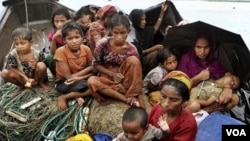The U.N. Special Investigator on the situation in Myanmar said she sees worrying signs of backtracking by the government on key human rights issues. In her first report to the U.N. Human Rights Council, Yanghee Lee documents crackdowns on freedom of expression, discrimination against ethnic and religious minorities and other cases of human rights violations and abuse.
U.N. Investigator Yanghee Lee said she is concerned by, what she calls the "shrinking of the democratic space in Myanmar." She said this can be seen in the excessive and disproportionate force used by police against students during recent protests.
She said 127 people were subsequently arrested in the country also known as Burma.
“In some areas, backtracking has gained momentum. Many civilians, people, students, farmers, who try to express their dissatisfaction on land evictions or dissatisfaction with policies or practices are not being able to be heard appropriately and they are being addressed in a very severe manner ... and we have seen many people who have been arrested and hurt during this process,” said Lee.
In addition to 27 political prisoners, the U.N. investigator notes 14 protesters have been sentenced to six months imprisonment, 78 farmers are serving sentences for trespassing on confiscated land, and a further 200 activists are on bail and awaiting trial. She considers them all to be political prisoners and is calling for their release.
Yanghee Lee expressed concern at the alarming escalation of fighting last month in the Kokang region of north-eastern Shan State, and she condemned the violence and human rights violations in Kachin State.
She said the situation of the Rohingya Muslims in Rakhine State remains dire. She told VOA that conditions are abysmal in camps she visited housing about 140,000 Muslims.
“In the Muslim camps, none of the IDPs [Internally Displaced People] have freedom of movement to go outside. Mobile clinics come once a week or twice a week. There is a shortage of food in the Muslim camps," said Lee. "We have many children being born in these camps and there is no services, health services, food even for these young newborns and so adults are giving up their meals.”
Meanwhile, Burma's government has decreed the white cards held by hundreds of thousands of Rohingyas will expire at the end of the month. The cards are identity documents granting the Muslims temporary residence in the country, even to those who have been born and lived in the country for generations.
Lee said the prospect of what might happen to the Rohingyas when these cards expire is terrifying to contemplate.
Burma is scheduled to hold a General Election later in the year. The U.N. investigator is calling for changes to the Constitution that bars pro-democracy leader Aung San Suu Ki from becoming president because her sons are foreign nationals. She said everyone should be eligible to be democratically elected.
Lee was verbally attacked and insulted by a leading Buddhist monk in January at the end of her last mission to Myanmar. The same monk, U Wirathu has again attacked her in response to her report to the Council, calling her “the beastly woman.”
Despite his threats, the U.N. investigator said she is confident the government will ensure her safety and that of her staff during any future visit to the country.




